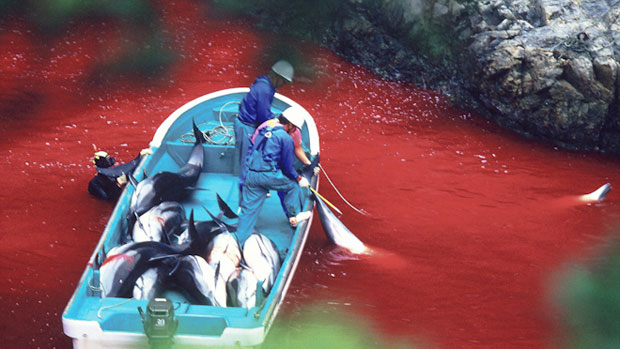Japan's dolphin slaughter gets underway despite protests
Annual killing of hundreds of dolphins depicted in film The Cove has started in southwestern Japan

A free daily email with the biggest news stories of the day – and the best features from TheWeek.com
You are now subscribed
Your newsletter sign-up was successful
THE seas in a corner of southwestern Japan are about to turn red with blood as the annual Taiji community dolphin hunt gets underway.
Revealed to the wider world by the Oscar-winning 2009 documentary The Cove, the yearly slaughter of hundreds of dolphins has attracted almost universal disgust and condemnation from outside of Japan.
Not that that is of any concern to Kazutaka Sangen, the mayor of Taiji, who defended the practice to CNN. "We have fishermen in our community and they are exercising their fishing rights," he explained. "We feel that we need to protect our residents against the criticisms."
The Week
Escape your echo chamber. Get the facts behind the news, plus analysis from multiple perspectives.

Sign up for The Week's Free Newsletters
From our morning news briefing to a weekly Good News Newsletter, get the best of The Week delivered directly to your inbox.
From our morning news briefing to a weekly Good News Newsletter, get the best of The Week delivered directly to your inbox.
The criticisms unleashed by The Cove have forced the Wakayama Prefectural Government, where Taiji is situated, to make some concessions. According to Sangen the hunting techniques have become "less crude" while the government has established a quota that limits the kill to 2,026 small porpoises and dolphins.
Nonetheless environmentalists are outraged at the annual cull and the Sea Shepherd Conservation Society has been live-streaming video of the hunt from Taiji Cove.
According to CNN the video stream makes for disturbing viewing. It shows dolphins "appearing severely stressed [and] some even tried to jump over partitions and flailed as they got tangled in nets".
For three nights more than 200 dolphins have been trapped in the cove, terrified, exhausted and hungry as the Japanese hunters separate them from their pods.
A free daily email with the biggest news stories of the day – and the best features from TheWeek.com
CNN says the fishermen will today select which dolphins to sell to marine parks and aquariums in Japan and around the world. Tomorrow, those that have not been chosen will be slaughtered for their meat.
Caroline Kennedy, the recently appointed US ambassador to Japan, let it be known via twitter that she was "deeply concerned by inhumaneness of drive hunt dolphin killing", although her stance received short shrift from Sangen.
"There always are the people who say it's wrong and it's right, but what we have to see is if fishermen are hunting endangered species or not. They don't. We are fishing under the permission just like the US does."
According to CNN, most Japanese support Sangen and the fishermen. Masayhisa Sato, a Japanese lawmaker tweeted that the "dolphin hunt is also a traditional fishing culture. I wonder whether it's appropriate for [the US] ambassador to comment on this."
Meanwhile the Sea Shepherd Conservation Society has vowed to continue streaming images from the cove tomorrow when the killing begins.
In the meantime, the animals are already stressed - and occasionally injured - by the process of selecting the animals which will be sold to acquariums.
The process of picking the "prettiest" dolphins is carried out in shallow water and is "brutal and stressful," said a Sea Shepherd spokesman. "Some of the dolphins die from injuries incurred during the manhandling or simply the stress."
-
 Buddhist monks’ US walk for peace
Buddhist monks’ US walk for peaceUnder the Radar Crowds have turned out on the roads from California to Washington and ‘millions are finding hope in their journey’
-
 American universities are losing ground to their foreign counterparts
American universities are losing ground to their foreign counterpartsThe Explainer While Harvard is still near the top, other colleges have slipped
-
 How to navigate dating apps to find ‘the one’
How to navigate dating apps to find ‘the one’The Week Recommends Put an end to endless swiping and make real romantic connections
-
 Epstein files topple law CEO, roil UK government
Epstein files topple law CEO, roil UK governmentSpeed Read Peter Mandelson, Britain’s former ambassador to the US, is caught up in the scandal
-
 Iran and US prepare to meet after skirmishes
Iran and US prepare to meet after skirmishesSpeed Read The incident comes amid heightened tensions in the Middle East
-
 Israel retrieves final hostage’s body from Gaza
Israel retrieves final hostage’s body from GazaSpeed Read The 24-year-old police officer was killed during the initial Hamas attack
-
 China’s Xi targets top general in growing purge
China’s Xi targets top general in growing purgeSpeed Read Zhang Youxia is being investigated over ‘grave violations’ of the law
-
 Panama and Canada are negotiating over a crucial copper mine
Panama and Canada are negotiating over a crucial copper mineIn the Spotlight Panama is set to make a final decision on the mine this summer
-
 Why Greenland’s natural resources are nearly impossible to mine
Why Greenland’s natural resources are nearly impossible to mineThe Explainer The country’s natural landscape makes the task extremely difficult
-
 Iran cuts internet as protests escalate
Iran cuts internet as protests escalateSpeed Reada Government buildings across the country have been set on fire
-
 US nabs ‘shadow’ tanker claimed by Russia
US nabs ‘shadow’ tanker claimed by RussiaSpeed Read The ship was one of two vessels seized by the US military